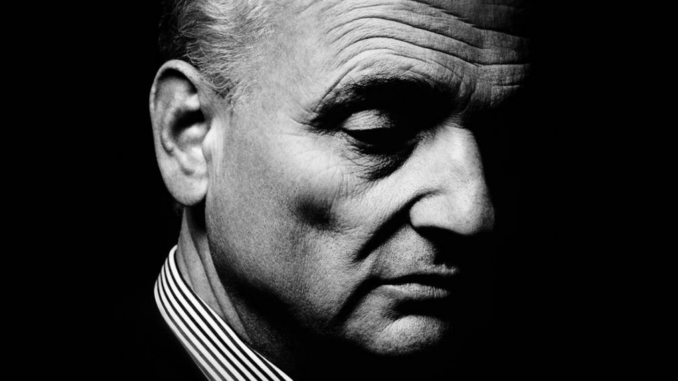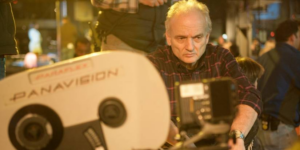
Introduction
David Chase, the creator of The Sopranos, is one of the most influential minds in television. After reshaping the landscape of modern TV with his portrayal of complex characters, morally ambiguous antiheroes, and a deep dive into the mafia world, Chase’s return to the Sopranos universe was highly anticipated. With Wise Guy, his latest project, the writer-director doesn’t hold back. But does this new addition to the Sopranos universe live up to the hype?
In this review, we’ll take a closer look at what Wise Guy offers, its connection to The Sopranos, and whether it enhances or detracts from the legacy of one of the greatest shows in TV history.
David Chase’s Wise Guy—A Fresh Take on the Mafia World
Wise Guy is more than just a continuation of The Sopranos universe. It’s a reinvention of the themes, characters, and gritty realism that made The Sopranos legendary. Chase pulls no punches in his exploration of the mafia world, diving deep into the psychology of power, loyalty, and betrayal. But how does Wise Guy hold up against the masterpiece that was The Sopranos? Let’s break it down.

A Glimpse Into the Past—Does Wise Guy Offer a Fresh Perspective?
One of the key elements that make Wise Guy so compelling is its ability to look back at the mafia world without simply rehashing old ground. Chase revisits familiar themes, but with a fresh lens. The story is not a direct continuation of The Sopranos, but rather a story set in a similar universe.
H3: A Different Era, Same Consequences
While The Sopranos took place in the 1990s and early 2000s, Wise Guy explores the mafia world of an earlier time. It’s a world of old-school gangsters, where power dynamics and loyalty are everything. However, much like Tony Soprano’s world, Wise Guy shows that the consequences of betrayal are far-reaching. Chase’s ability to interweave the past and present gives Wise Guy its unique flavor, breathing new life into familiar mafia tropes.
The Grit and Gritty Realism of the Mafia
Chase is known for his unflinching portrayal of the mafia world, and Wise Guy does not shy away from the uglier side of organized crime. The show delivers on gritty realism, showing the ruthless behavior of gangsters while also delving into their personal struggles. It’s a delicate balance that The Sopranos mastered, and Chase does the same here. The characters are flawed, vulnerable, and human.
H3: Complex Characters with Deep Motivations
As in The Sopranos, the characters in Wise Guy are multi-dimensional. They are not defined solely by their criminal behavior but by their internal conflicts, personal histories, and relationships. We see gangsters who are, in their own twisted way, trying to find meaning in a world that values power over everything else. The struggles they face are relatable—even though they may be involved in a life of crime.
H4: The Mafia Code—Still Holding Strong
One of the key themes of both The Sopranos and Wise Guy is the code of the mafia. In Wise Guy, we see the continuation of this code—a set of unspoken rules that govern the actions of the characters. Loyalty, respect, and honor are paramount. But as the world changes, so does the interpretation of these rules. Chase examines how the traditional mafia code is challenged by modern forces, both inside and outside of the organization.
The Influence of The Sopranos on Wise Guy
It’s impossible to talk about Wise Guy without acknowledging the shadow of The Sopranos. The series set a standard for crime dramas, blending dark humor, psychological depth, and a slow-burn narrative that explored the human condition in a way few shows had before. Wise Guy carries that legacy forward, with some obvious nods to The Sopranos universe.
H3: Easter Eggs and References Galore
For die-hard Sopranos fans, Wise Guy is a goldmine of Easter eggs and references. From subtle callbacks to the iconic characters to thematic similarities in the storytelling, there’s a lot for fans to unpack. These references add layers of depth to the narrative, creating a sense of continuity for those who have followed Chase’s work over the years.
H3: Tony Soprano’s Shadow Looms Large
Even though Tony Soprano does not appear in Wise Guy, his presence is felt throughout the series. The themes of power, family, and mental health that defined The Sopranos are revisited in new ways, and you can’t help but think of Tony when witnessing some of the show’s most tense moments. Chase is clearly drawing on his past success with The Sopranos while also charting a new course for the mafia genre.
The Cinematic Style of David Chase
One of the things that sets David Chase apart as a director and writer is his cinematic approach to storytelling. In Wise Guy, he once again demonstrates his ability to create a world that feels both grounded and cinematic. The use of lighting, camera angles, and pacing all contribute to the gritty, atmospheric tone of the show.
H3: The Visuals—A Blend of Classic and Contemporary
Wise Guy combines the old-school aesthetic of the mafia world with modern sensibilities. The cinematography recalls the look of classic crime films while also incorporating elements of contemporary filmmaking. This visual blend helps to keep the show fresh and engaging while still honoring the traditions of the genre.
The Music—An Integral Part of the Experience
As with The Sopranos, music plays a crucial role in shaping the mood and atmosphere of Wise Guy. The soundtrack is expertly curated, blending classic rock, soul, and contemporary hits. The music serves as a character in itself, helping to underscore the emotional beats of the story and giving the show an added layer of depth.
Is Wise Guy the Next Big Mafia Hit?
Wise Guy has certainly set itself up as the next big mafia series to captivate audiences. With David Chase at the helm, it’s hard not to expect greatness. But does it live up to the massive expectations that come with the legacy of The Sopranos?
H3: A Worthy Successor
While Wise Guy isn’t a direct continuation of The Sopranos, it is a worthy successor. The series captures the essence of what made The Sopranos so revolutionary, while also bringing something new to the table. It explores different facets of the mafia world, while staying true to Chase’s unique vision.
H4: Will it Reach the Same Heights as The Sopranos?
That’s a tough question. While Wise Guy is certainly a strong contender, The Sopranos set an incredibly high bar. It’s unlikely that any series will replicate the cultural impact that The Sopranos had, but Wise Guy definitely carves out its own space in the mafia genre.
Conclusion: A Bold Return to the World of The Sopranos
David Chase’s Wise Guy is a thrilling return to the mafia world that made him famous. With its complex characters, gritty realism, and cinematic style, it’s clear that Chase is still at the top of his game. While it may not eclipse the impact of The Sopranos, it adds another rich layer to the world of organized crime that fans of the genre will appreciate. If you loved The Sopranos, Wise Guy is a must-watch.
FAQs
1. Is Wise Guy a continuation of The Sopranos?
No, Wise Guy is set in a similar mafia universe but is not a direct continuation of The Sopranos storyline. It explores a different era of the mafia world.
2. What makes Wise Guy stand out from other mafia shows?
Wise Guy stands out due to David Chase’s unique storytelling approach, blending old-school mafia elements with modern sensibilities, creating a rich and atmospheric viewing experience.
3. Does Wise Guy have any references to The Sopranos?
Yes, Wise Guy features numerous Easter eggs and subtle references to The Sopranos, making it a treat for long-time fans of the show.
4. Is the music important in Wise Guy?
Absolutely. The music in Wise Guy is a key part of the show’s emotional impact, much like it was in The Sopranos.
5. Can Wise Guy live up to the legacy of The Sopranos?
While it’s difficult to match the cultural impact of The Sopranos, Wise Guy stands on its own as a worthy successor, with strong performances, compelling storylines, and David Chase’s signature touch.